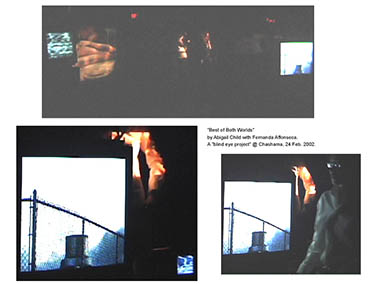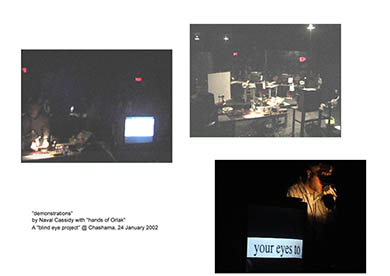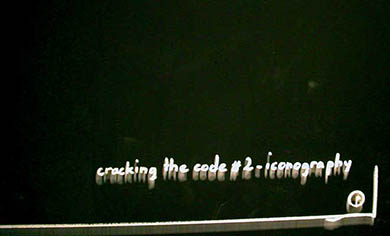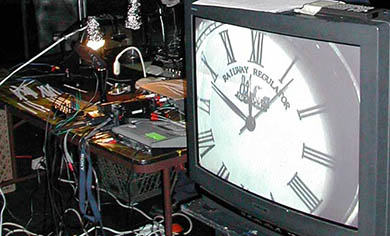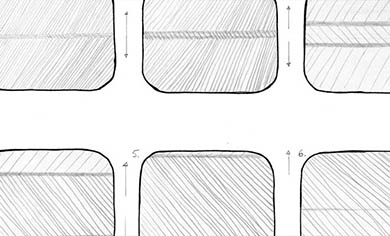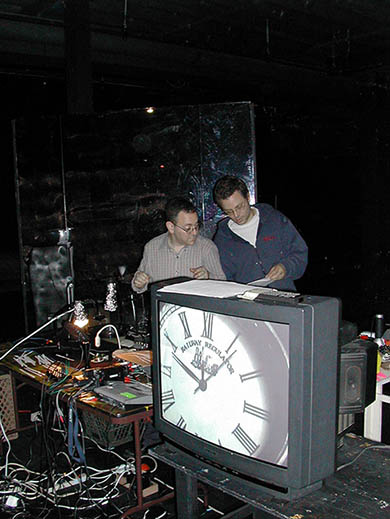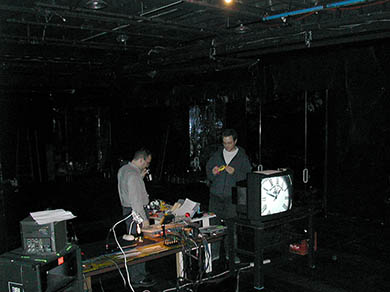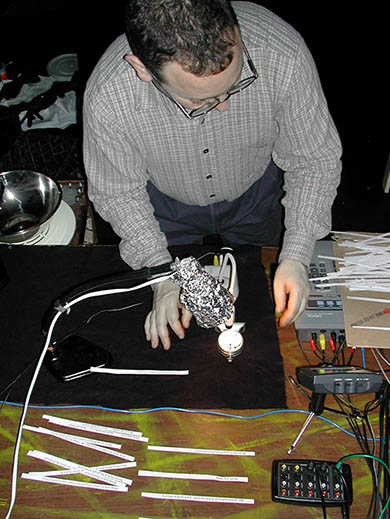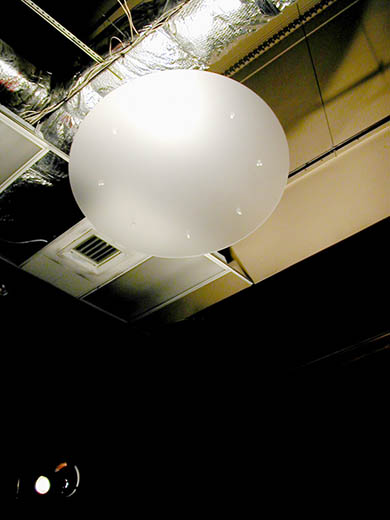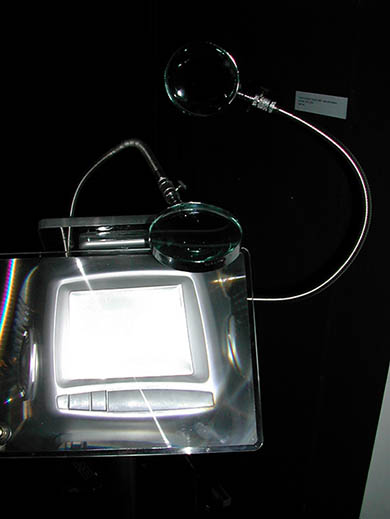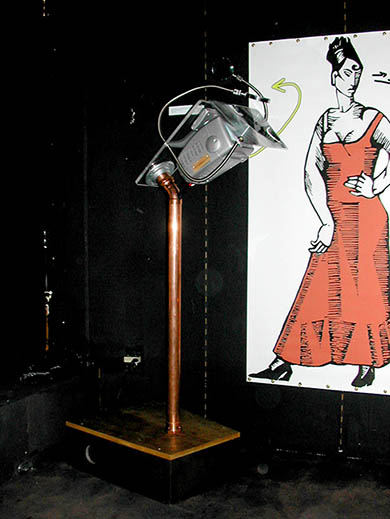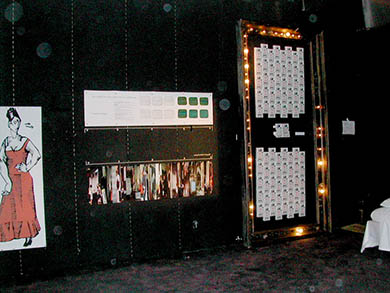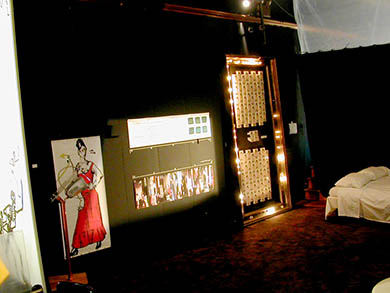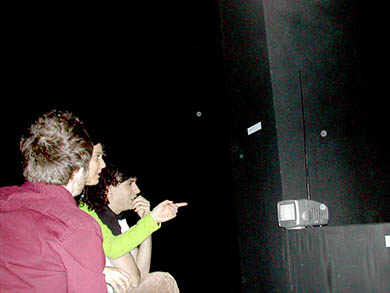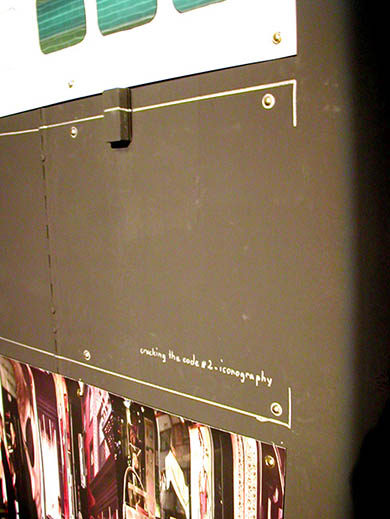← TIMES SQUARE, NYC - CHASHAMA Theater — 2001 Nov
An extravaganza of “deflective media” in global “attractive” media’s vital center.
The “EXTRAVAGANZA” began in November 2001 with the installation of a storefront window facing 42nd street and an art exhibit inside, and on January 24th 2002, a live video and performance.
By February 2002 the “EXTRAVAGANZA” expanded to include storefronts in Vienna, Austria, and Brooklyn, NY.
The art exhibit featured willy mal, Benton-C Bainbridge, Steven Katz, Jean-Philippe Baert, Nathalie Adamidi and Bob Gill, among others. Opening night attracked over 100 visitors.
Bainbridge’s “blind heat” installation included a bed. The bed’s sheets served to reflect projected video from above, and a subwoffer underneath the bed broadcast the video soundtrack. His piece considered the idea of exciting physical passions while deflecting the direct viewer-attention. Visitors sat on the bed, felt the woofer kick and touched the video-flickered sheets.
The “exoptitron” playing “exoptic fields,” by mal, includes moveable magnifying lenses that invite manipulation and focus. Visitors responded by moving the lenses. Banners in the installation made the piece’s central intention explicit: to consider deflection as a media objective as opposed to “attraction.”
Jean-Philippe Baert also exhibited a video version of his TV “fossil” made by exposing photo paper to television screens during news broadcasts. A video loop of one such piece played on a 5″ screen.
Other work included Steven Katz’ 15-foot sculpture, “peer”; Bob Gill’s design for the “exoptic fields” video box, installed by willy mal; a storefront window by Nathalie Adamidi and willy mal; a video loop of Benton Bainbridge and Naval Cassidy speaking on a Canadian TV program describing “deflective” media and the “blind eye projects.”
On 24 January 2002, the performances started about 8:30pm before an audience of 65 people. Naval Cassidy’s performance, the first, followed his proposed design and included an assistant. Cassidy communicated detailed instructions to the audience via printed-text on paper strips drawn under a camera and displayed on a large TV monitor. These messages were mixed with other images produced and captured live. The printed instructions prepared the audience for a series of “demonstrations” on “looking” and “looking away.” These involved objects viewed by camera and direct, as well as objects thrown into the audience. The assistant used a tiny hand-held camera to his eye, for instance, to illustrate the procedure. This image appeared with the image of a clock used as the map of for eye-directions in one of the demonstrations. The audience could see Cassidy monitor his actions on a second screen above his long table of props.
Abigail Child’s “Best of Both Worlds” was a comparatively spare counterpoint to Naval’s calculated barrage. She and her assistant dressed in white smocks and black crotch-harnessed belts, miming lab technicians or electricians, positioned – and repositioned – themselves both casually and deliberately to reflect the light of TV monitors and to catch the projection of a film that was reflected off a Mylar wall onto a white screen. Two TV monitors, in sync, were tuned manually by Child, and assistant Fernanda Affonseca, to broadcast programming. These were often left tuned to distorted and rolling images but would surface occasionally into a realizable broadcast image. A third much larger screen played back a crisp video of city winter skyscapes, of roofs, smoking furnace stacks, rhymed with clouds rolling in real time across the frame. It included sound and had both a passive and faintly sinister overtone [the storm approaches] though its references were largely to the quotidian and diurnal exterior world. The film projector ran a sex scene from a 1970s pornographic film in which a man describes being penetrated by a woman wearing a “strap-on” dildo. Near the end of the piece we hear him state: “…It was like having the best of both worlds…” A third musical source played a minimal rapid-beat of synthesized music. The issues raised in the performance, inspired by the Exoptic Theme, include: the narrative force of the body; the body as obstacle and desire; ideas of INTERFERENCE; the competing textures of the mediated visual world as techno fuzz, window, and/or deflected projection [the reflected screen]; the contrast of attention between the exterior and the interior, between the ‘real’ and the mediated, between what can be ‘tuned’ and what continues despite human ‘ interference.’ All this with a crackling ironic humor bubbling underneath.
Fritz Donnelly’s “Very Special Performance Tonight Only” opened with a video of himself as a TV language instructor giving a series of lessons in a made-up language that sounded like Italian or Russian. He then appears, in person, as the language instructor and gives a lesson, inviting an audience member to participate. He invites the audience to repeat after him, and has many speaking this new language. In effect he “re-edits” the video tape in-vivo, on stage. Then he leaves stage to return as another character speaking a different made-up language and proceeds to rap in that Chinese-sounding language, pushing the “edit” to distortion.
Benton-C’s “blind heat: stasis & storm mix” positioned a large TV monitor on the floor, about center-stage, facing away from the audience to a Mylar wall. Benton-C launched a live re-mix of “blind heat” that included music that played on the TV, reflected in the wall or seen from the edges by the audience. Benton-C sat at a table on stage before his laptop and other equipment with glowing dials. Anita Durst appeared in a bride’s white dress, walked behind the TV to position herself to crawl and drag herself slowly over the monitor. Her dress’s folds reflected its pulsing light. For more than ten minutes she pulled herself directly toward the back wall, over the top of the set. While prone, propped on her elbows with her thighs still resting on the TV-top, she proceeded to smoke in this position before pulling herself completely off the set, rolling to the side and standing. She made several walking turns then left the stage.
